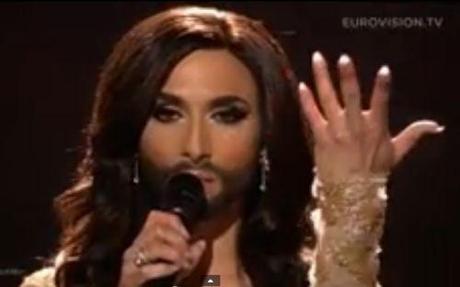Eurovision is an annual song competition, since 1956, held among the member countries of the European Broadcasting Union (EBU).
Each member country submits a song to be performed on live television and radio and then casts votes for the other countries’ songs to determine the most popular song in the competition. The contest has been broadcast every year since its inauguration in 1956 and is one of the longest-running television programs in the world. It is also one of the most watched non-sporting events in the world, with audience figures having been quoted in recent years as anything between 100 million and 600 million internationally.
Since 2009, national votes in Eurovision semifinals are a 50/50 combination of both telephone votes by the public and the votes of juries made up of music professionals.

I use the pronoun “it” because I am genuinely confused.
As you can see in the pic above, Wurst is dressed like a woman, has long hair and heavy eye makeup, but it also has a full moustache and beard.
As I was considering posting about Wurst’s win, I thought to myself:
“You must try to be impartial. Maybe those voting used admirably strict achievement criteria, that is, how well the contestants sang. Despite its bizarre appearance, Wurst’s singing must be so superlative that the public and professional juries conferred the award on it.”
But as you can hear for yourself, that’s not the case. By no stretch of the imagination can one say that Conchita Wurst’s singing is stellar.
The conclusion, therefore, must be that Europeans selected Conchita Wurst precisely because it is a bearded transvestite.
Wikipedia says “Conchita Wurst” is the “drag persona” of 27-year-old Austrian singer Thomas Neuwirth.
~Eowyn

